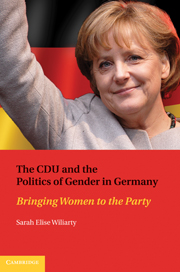Book contents
- Frontmatter
- Contents
- List of Figure and Tables
- Acknowledgments
- The CDU and the Politics of Gender in Germany
- Introduction: A Democratic Paradox?
- 1 The Puzzle of CDU Policy Making on Women's Issues
- 2 The Corporatist Catch-All Party Model
- 3 The Postwar CDU: Origins of a Corporatist Catch-All Party
- 4 The Emergence of the Women's Union, 1969–1982
- 5 The Women's Union in the Dominant Coalition, 1982–1989
- 6 Looking Eastward: The Women's Union and Cobbled Coalitions, 1989–1998
- 7 The Rise of Angela Merkel: Policy and Personnel Decisions of the CDU in Unified Germany
- 8 Christian Democracy With and Without Corporatism: Policy Making on Women's Issues in Austria, Italy, and the Netherlands
- 9 Conclusion
- Appendix: List of Cited Interviews
- List of References
- Index
Introduction: A Democratic Paradox?
Published online by Cambridge University Press: 17 November 2010
- Frontmatter
- Contents
- List of Figure and Tables
- Acknowledgments
- The CDU and the Politics of Gender in Germany
- Introduction: A Democratic Paradox?
- 1 The Puzzle of CDU Policy Making on Women's Issues
- 2 The Corporatist Catch-All Party Model
- 3 The Postwar CDU: Origins of a Corporatist Catch-All Party
- 4 The Emergence of the Women's Union, 1969–1982
- 5 The Women's Union in the Dominant Coalition, 1982–1989
- 6 Looking Eastward: The Women's Union and Cobbled Coalitions, 1989–1998
- 7 The Rise of Angela Merkel: Policy and Personnel Decisions of the CDU in Unified Germany
- 8 Christian Democracy With and Without Corporatism: Policy Making on Women's Issues in Austria, Italy, and the Netherlands
- 9 Conclusion
- Appendix: List of Cited Interviews
- List of References
- Index
Summary
The summer of 2005 was an exciting one in German politics. On May 22, the Social Democratic Party (SPD) suffered a serious defeat in its electoral heartland, North Rhine-Westfalia, which led Chancellor Gerhard Schröder to call for surprise early elections in the fall. The Christian Democrats chose to run Angela Merkel, chair of the Christian Democratic Union (CDU), as their candidate. After starting the summer with a 25 percent point lead, Merkel lost ground throughout the campaign. From her controversial choice of Paul Kirchhof as future Finance Minister to her poor performance in the televised debate, it seemed Merkel could do nothing right. On September 18, the Christian Democrats received 35.2 percent of the vote and the Social Democrats received 34.2 percent. Neither major party had sufficient votes to form a government with its preferred coalition partner. After two months of wrangling, Merkel finally emerged as the leader of a grand coalition made up of the Christian Democrats and the Social Democrats.
Merkel may have seemed like an odd choice for the Christian Democrats. After all, the CDU is a traditionally Catholic party and she is a Protestant. The CDU has traditional social values, yet it elected a woman. The CDU has struggled to gain votes in the former East Germany and has often seemed ineffective when campaigning there, yet the party elected the first eastern Chancellor. How did this conservative party come to make such an unusual choice for the most important position in the country?
- Type
- Chapter
- Information
- The CDU and the Politics of Gender in GermanyBringing Women to the Party, pp. 1 - 18Publisher: Cambridge University PressPrint publication year: 2010



